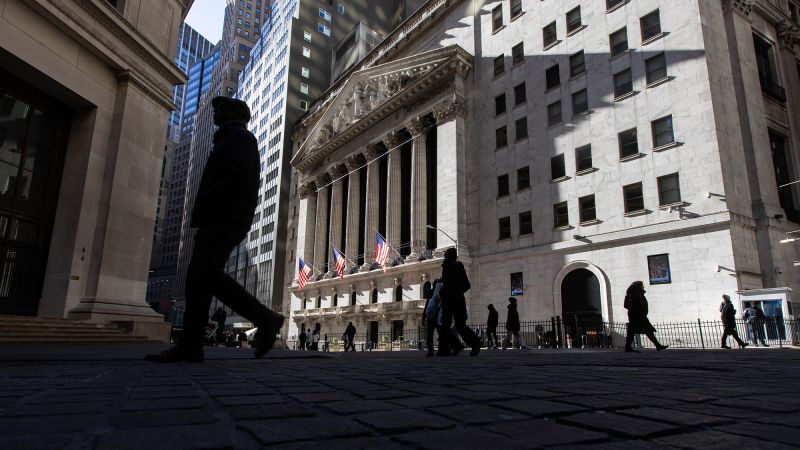New York
CNN
—
A powerful force is dominating the Trump economy: fear.
About two-thirds (66%) of adults say they are pessimistic or afraid about the economy, according to new findings from a CNN/SSRS poll released Monday. Just 34% say they feel enthusiastic or optimistic.
The overwhelming majority – 69% – consider an economic recession in the next year to be at least somewhat likely, including 32% who say it’s very likely.
This sense of dread in the first 100 days of the second Trump presidency isn’t just a political problem for the White House. It’s also a psychological problem for an economy that requires consumer spending to stay afloat.
This raises the risk of a recession becoming a self-fulfilling prophecy. Fear of a recession causes Americans to shop less and save more. Vacations aren’t booked. Cars aren’t purchased. Restaurants aren’t full.
CEOs, worried about consumers hunkering down, do the same. They hire fewer and fire more. And that causes consumers to pull back even further, prompting even more layoffs.
It can become a negative feedback loop that is hard to break.
The economy and financial markets are a confidence game – one that has been shaken by President Donald Trump’s trade war and sweeping April 2 tariff announcement, attacks on Federal Reserve independence and chaotic policymaking.
“April 2nd was a turning point. It’s been four weeks of chaos, and the chaos has been disruptive. We are beginning to pay the price for it,” said David Kotok, co-founder of investment management firm Cumberland Advisors.
It’s clear that consumer sentiment has been dropping. The CNN poll found that seven in 10 of those under the age of 45 express pessimism or fear about the economy. So do 76% of Americans of color.
And it’s true that Democrats are more pessimistic than Republicans about the state of affairs. But the CNN poll found bipartisan economic concerns, with 39% of those who voted for Trump in 2024 saying a recession is very or somewhat likely in the next year.
Still, it’s far too early to know if the turbulence in financial markets will short-circuit the economic expansion that began after the Covid-19 pandemic crash.
It’s entirely possible that weak consumer confidence does not cause a drop in consumer spending. That’s exactly what happened in 2022, a time when many consumers and economists were similarly sounding the recession alarm – only to be proven wrong.
The US economy has proven very resilient. It shook off multiple Covid variants, the supply chain mess, the inflation crisis and the regional bank failures of 2023. And so far this year, there isn’t much evidence that Americans have stopped spending.
Retail sales jumped and car sales surged in March as consumers tried to beat the clock on tariffs. Restaurant reservations on OpenTable are higher than a year ago.
And it’s possible that the massive rebound in US stocks after Trump delayed country-specific tariffs for 90 days could improve the mood on main street as it did on Wall Street.
Bankruptcy fears for the toy industry and beyond
Weak confidence among consumers could interrupt the business cycle.
“A lot of businesses are getting nervous. They could pause spending or cut back on travel and hiring. And that’s what could make this a self-fulfilling prophecy,” David Kelly, chief global strategist at JPMorgan Asset Management, told CNN in a phone interview.
Consider that 81% of small toy companies and 87% of mid-sized toy companies are delaying orders due to tariffs, according to an April survey by the Toy Association, a trade group.
That same survey found that almost half of all small- and mid-sized toy makers say they will go out of business within weeks or months.
“We are starting to see the first signs of the supply chain breakdown from tariffs. My expectation is that it will worsen,” said Kotok, who pointed to a surge of container ships sitting offshore and canceled sailings.
BlackRock CEO Larry Fink recently said many business leaders fear the US economy is already in a recession, and JPMorgan’s Kelly said he is most concerned about how CEOs will respond to economic worries.
Just last week, Southwest Airlines CEO Bob Jordan highlighted most severe drop in domestic leisure travel outside of the pandemic, telling Bloomberg News: “I don’t care if you call it a recession or not, in this industry, that’s a recession.”
Kelly said it may be a “shallow” recession but “the odds still favor us slipping into recession unless we see a sharp about-face on tariffs.”
Torsten Slok, chief economist at investment firm Apollo Global Management, goes a step further, saying there is a 90% chance of a “voluntary trade reset recession.”
“Expect ships to sit offshore, orders to be canceled, and well-run generational retailers to file for bankruptcy,” Slok wrote earlier this month in a report.
Jared Bernstein, a top economist for President Joe Biden during the last recession scare in 2022, cautioned against assuming a recession is inevitable.
“We’ve gone through years of bad vibes and good data. We have to be careful not to over-torque on this,” Bernstein told CNN in a phone interview.
Still, Bernstein sees a roughly 50/50 chance of a US recession because of the stagflationary shock from tariffs, which are expected to simultaneously slow the economy and increase prices.
The policy whiplash is also a problem.
“Even if we believe (Trump) will dial back the trade war,” Bernstein said, “how confident can we be that he won’t dial back his dial-back the next day?”

